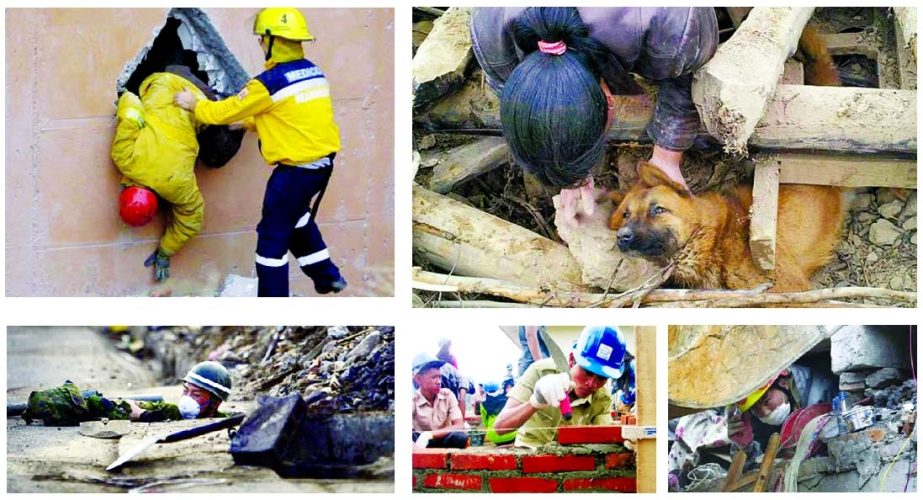
Md Norul Alam Raju :
Owing to its geological location, Bangladesh is a country highly susceptible to earthquakes and their secondary effects. This vulnerability however is continuing to increase as a consequence of rapid urbanisation, unplanned growth, a lack of governance, an unskilled labour force in seismic resistant construction and inadequate preparedness.
According to a CDMP study, if an earthquake measuring 6 on the Richter scale were to occur in Dhaka; approximately 78323s building would be destroyed whereas a 7.5 magnitude earthquake would lead to the destruction of 72,316 buildings in the capital with 53,166 partially damaged.
In the case of an 8.5 magnitude tremor, 238,164 buildings across the country would be completely destroyed.
The Rana Plaza collapse, on April 24, 2013 is a clear example of both the governments and emergency service agencies lack of emergency preparedness. Following a tremor, the collapse of this single building killed 1134 people and wounded more than 2000 workers.
Despite the severity of the event, the government’s ‘all out action’ and search and rescues operations took a total of 25 days to complete.
Logically, curiosity grows.
If a moderate tremor were to hit causing the collapse of thousands of buildings, how long would the government take to instate an effective search and rescue operations?
– Taking into account the minimised level of preparedness and the huge gap in equipment and stock. This vulnerability is heightened when considering the lack of a skilled workforce in seismic resistant construction methods, in particular masons, bar – binders, civil engineers, plumbers and labour contractors.
The construction of residential building (non-residential too) in Bangladesh is carried out primarily by the informal sector; whether it is the owners or builders. The majority of the workforces however have acquired little or no formal training or experience – most relying upon inefficient trial and error.
Despite recent initiatives by the government towards improving the seismic performance of new constructions through the incorporation of seismic design in the building construction process, local masons and small contractors will continue to play significant role in the building construction development.
Therefore by enhancing their skills in seismic resistant, subsequently improving the earthquake resistance of informal non-engineered buildings, there will be considerable reduction in loss of live as well as property destruction following an earthquake.
Addressing the necessity of a larger skilled workforce, the Government of Bangladesh has taken initiative to train masons and bar binders through the Housing and Building Research Institute (HBRI).
At present, HBRI with help of the Comprehensive Disaster Management Program (CDMP) are conducting training courses at earthquake risk prone areas including Dhaka, Sylhet, Rangpur, etc areas in order to provide this workforce basic knowledge on earthquake resistant construction technology. However, this process is yet to be mainstreamed within differing departments of the governments and stakeholders at a non – government level and demands the exploration of alternative comprehensive strategies to be implemented in an organised approach; bringing positive long-term impacts for the relevant labour forces.
Here, Oxfam’s good practice can be disseminated. In 2012, Oxfam jointly with two other nongovernmental organisations supported a local group of masons, bar-binders and plumbers under the Sylhet City Corporation. The group known as the ‘Sylhet Mason Forum’ consists of 30 masons working in different wards of the city.
In addition to organising capacity building training for forum members on multi-hazard resilient construction techniques ensuring not only theoretical knowledge and understanding of risk resilient design but practical demonstration of retrofitting targeted structures currently vulnerable to multiple hazards.
By improving the capacities of ground level implementers on relevant construction practices, the vulnerability of buildings can be minimized to an acceptable level.
In addition to this, the forum is supported to organise their own monthly meetings, develop its constitution, arrange an office set up and manage a list of mass awareness campaigns from household to household and construction points.
Over time, this forum has transformed into a formal turned into a formal support system; having access to a bank account with savings and a members list and currently – aiming to register with the government as a Community Based Organisation (CBO).
It has become apparent to Oxfam the long term benefits of supporting a formal forum in the earthquake vulnerable cites of Bangladesh as opposed to simply providing lump sum. In order to achieve this, among many other activities, a pool of Master Trainers (MTs) initiative could be implemented within each earthquake prone areas with participants listed from local engineers, masons, bar-binders and local contractors.
These MTs will then be listed by the HBRI and made available on their website so that the trained workforces can be reached by individuals and other organisations and in this sector. It is then expected that the trained and listed Master Trainers will continue their effort to disseminate knowledge acquired through facilitating sessions at a grass root level.
Alternatively, facilitation and motivation is required in order to build links between trained masons, bar-binders, engineers and architects with HBRI, the Local Government Engineering Office, Institute of Engineers of Bangladesh (IEB), Institute of Architects Bangladesh (IAB), town planning organisations and the private sector so that the trained labour force is prioritised when work is distributed while helping them to connect and motivate dissemination of their knowledge.
The entire process will provide us with a list of trained workforce effective in earthquake prone cities – who will contribute towards developing earthquake resilient infrastructure.

